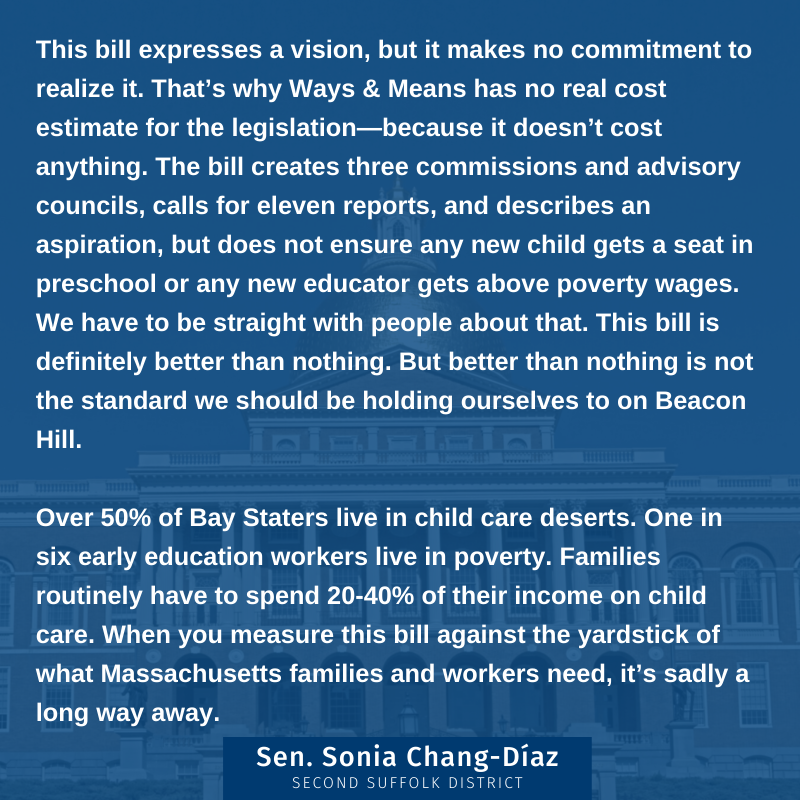The Massachusetts State Senate on Thursday passed legislation that authorizes more than $10.84 billion in bonds for a wide array of transportation infrastructure projects and initiatives to make the Commonwealth’s transportation system more modern, safe, environmentally sound, and accessible. An Act relative to Massachusetts transportation resources and climate, also known as MassTRAC, ensures that Massachusetts is well-positioned to compete for federal grant opportunities, particularly those dollars available from the federal bipartisan Infrastructure Investment and Jobs Act.
“While repairs to our transportation infrastructure will be beneficial to many communities across the Commonwealth, this bill goes much further than merely repairing but will instead actively transform our infrastructure to be more modern, environmentally sustainable, and regionally equitable,” said Senate President Karen E. Spilka (D-Ashland). “The support for electric vehicles, regional transportation authorities, low-income fares on public transit, expanded East-West connectivity, and many other initiatives included in this bill will bring benefits to residents, visitors and businesses throughout Massachusetts. I want to thank Senator Crighton for quickly and adeptly taking on the role of Transportation Chair and for collaborating with Senators Rodrigues and Collins as well as so many Senators to produce this comprehensive legislation.”
“Today’s passage of this multi-pronged $10.84 billion transportation infrastructure investment package builds on our longstanding commitment to ensure the Commonwealth’s transportation system is more equitable, reliable, safe and modern,” said Senator Michael J. Rodrigues (D-Westport), Chair of the Senate Committee on Ways and Means. “Going far beyond just roads and bridges, the Senate’s transportation bond bill will stimulate our economy, increase accessibility for our residents, support local businesses, create jobs, and boost economies in all corners of our Commonwealth. Importantly, it also invests in public transit, electric vehicle charging infrastructure, regional transit authorities as well as emissions-free transportation options—like biking, walking, and multimodal investments—which are vital solutions to help us confront our climate challenges and achieve our 2050 net zero goals. I want to thank Senator Crighton for his leadership and hard work on all things transportation, Senator Collins for his meaningful contributions, and the Senate President for her continued vision, leadership and guidance.”
“This transportation bond bill provides Massachusetts with the key to unlock once-in-a-generation federal funding from the bipartisan infrastructure law,” Senator Brendan Crighton (D-Lynn), Senate Chair of the Joint Committee on Transportation. “With these combined state and federal investments, we will be able to complete vital work on our highways, roads, bridges, and public transportation systems, improving mobility for all residents of the Commonwealth.”
“This legislation represents a collaborative effort centered on transportation safety, accessibility, and sustainability in a way that is fiscally responsible,” said Senator Nick Collins (D-Boston), Senate Chair of the Joint Committee on Bonding, Capital Expenditures and State Assets. “Due to smart planning and responsible budget management, we are not only positioning our state to remain competitive and prosperous post pandemic, we are able to do so in a way that continues to get a better rate for the taxpayer.”
The MassTRAC bill invests billions of dollars in improving, maintaining, and modernizing the Commonwealth’s bridges, roads, and other critical infrastructure, including sidewalks, curbs, parking spaces, and airport improvements. The legislation also takes crucial steps to make the state’s transportation system more environmentally sustainable and resilient to climate change by making investments in emission reduction, low or no emission vehicles for Regional Transit Authorities (RTAs), climate adaptations for Massachusetts roads, and support for multimodal transportation such as bike lanes alongside roads. Building on the Drive Act, passed by the Senate in April this year, the MassTRAC bill increases support for electric vehicles for personal, commercial, and governmental use, as well as for electric vehicle charging infrastructure.
The breakdown of the bond authorizations included in the bill is as follows:
- $3.5 billion for discretionary federal grant projects
- $2.8 billion for federal highway systems projects
- $1.375 billion for Massachusetts Bay Transportation Authority (MBTA) modernization
- $1.27 billion for non-federally aided roads and bridges
- $407.7 million for local and regional transportation projects
- $400 million for MBTA safety projects
- $275 million for the East-West rail project
- $225 million for emissions reduction initiatives, including $50 million to support access to electric vehicle charging infrastructure
- $114 million for airport improvements
- $85 million for state-numbered routes road pavement improvements
- $82 million for the industrial rail access program
- $64.9 million for Regional Transit Authorities’ (RTAs) capital projects
- $25.5 million for the mobility assistance program
- $25 million for municipal road pavement improvements
- $20 million for the Complete Streets program
- $10 million for the public realm improvement program
- $1 million for local and regional transportation projects
The legislation marks another step towards implementing East-West passenger rail in Massachusetts. In addition to the more than a quarter of a billion dollars that is granted for the project itself, this legislation creates a commission to investigate and report on creation of an East-West rail passenger authority. To promote regional equity and smart, sustainable financing of the transportation system, the bill creates a mobility commission to investigate, study, and make recommendations on the development of regionally equitable transportation pricing, roadway pricing and congestion pricing.
In addition to $1.375 billion for modernization of the MBTA, the bill authorizes $400 million for MBTA safety projects and tasks the MBTA with creating and annually updating safety improvement plans.
During the debate several notable amendments were adopted. Significantly, one amendment would create a low-income fare program to provide free or discounted transit fares to qualifying riders. Another amendment would require the MBTA to develop and implement short-, medium-, and long-term plans for electrifying the commuter rail fleet. Finally, an amendment was adopted to provide regulatory oversight for electronic bicycles, or e-bikes, to help spur their adoption.
A version of this legislation having previously been passed in the House of Representatives, a conference committee will now be appointed to reconcile any differences between the versions of this bill.
The legislation doc can be found -> https://malegislature.gov/Bills/192/S2989
 |
| MA Senate Passes Wide-Ranging Transportation Infrastructure Bond Bill |








